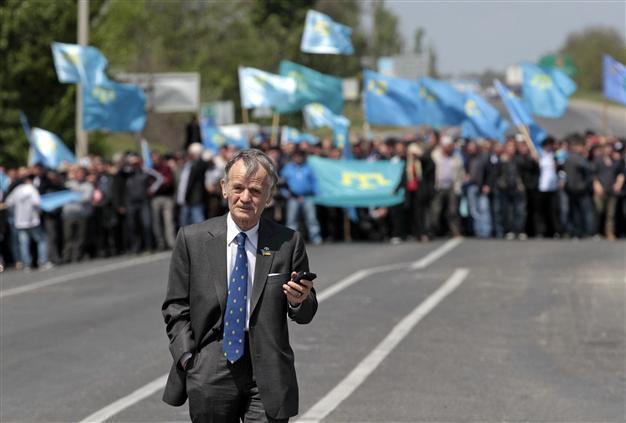Turkey condemns Crimea for denying Kırımoğlu’s entry
ANKARA – Anadolu Agency

Mustafa Abdülcemil Kırımoğlu walks near a checkpoint in Kherson region as he attempts to get to the territory of Crimea, near the city of Armyansk, May 3, 2014.REUTERS Photo
Turkey has condemned the Ukrainian breakaway region of Crimea over its refusal to allow the Crimean Tatar leader Mustafa Abdülcemil Kırımoğlu to enter the peninsula.A statement from the Foreign Ministry also expressed Turkey’s concerns over the recent investigation launched by a Russia-appointed prosecutor against the National Assembly of the Crimean Tatar People citing “illegal mass activities” by Crimean Tatars.
The statement said the Crimean Tatar Assembly was fully entitled to represent the Crimean Tatar community, according to a decision made by Ukraine’s Parliament on March 20.
“We expect the legitimate representative body of the Crimean Tatars to get the respect it deserves,” it said.
On May 3, Kırımoğlu was denied entry to his native Crimean peninsula, a day after he was barred from entering Russia.
“Moscow Airport authorities said I was forbidden from entering Russia and denied my entry,” he said at the time.
Kırımoğlu is the former chairman of the Crimean Tatars’ national assembly and a current Ukrainian MP.
In late April, Russian authorities had informed Kırımoğlu that he was not barred from entering the country despite rumors to the contrary. However, he said that before his departure from Crimea, border guards informed him that a ban was in place.
Crimea’s 300,000 Muslim Tatars, who make up around 12 percent of the peninsula’s population, largely boycotted a disputed referendum last month, in which nearly 97 percent of voters chose to split from Ukraine and join Russia.
In an attempt to appease the community, Russian President Vladimir Putin said April 21 he had signed a decree rehabilitating Crimea’s Tatars, who were deported under Stalin over accusations of Nazi collaboration and who fiercely oppose the region’s new Moscow-backed authorities.
















